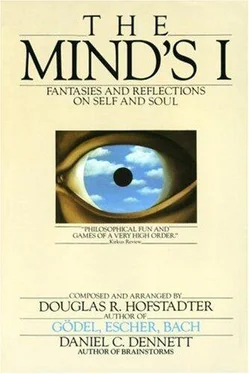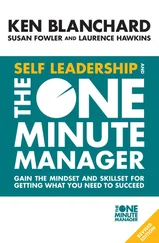It is true that a discrete state machine must be different from a continuous machine. But if we adhere to the condition of the imitation game, the interrogator will not be able to take any advantage of this difference. The situation can be made clearer if we consider some other simpler continuous machine. (A differential analyzer is a certain kind of machine not of the discrete state type used for some kinds of calculation.) Some of these provide their answers in a type form, and so are suitable for taking part in the game. It would not be possible for a digital computer to predict exactly what answers the differential analyzer would give to a problem, but it would be quite capable of giving the right sort of answer. For instance if asked to give the value of π (actually about 3.1416) it would be reasonable to choose at random between the values 3.12, 3.13, 3.14, 3.15, 3.16 with the probabilities of 0.05, 0.15, 0.55, 0.19, 0.06 (say). Under these circumstances it would be very difficult for the interrogator to distinguish the differential analyzer from the digital computer.
8. The Argument from Informality of behaviour. It is not possible to produce a set of rules purporting to describe what a man should do in every conceivable set of circumstances. One might for instance have a rule that one is to stop when one sees a red traffic light, and to go if one sees a green one, but what if by some fault both appear together? One may perhaps decide that it is safest to stop. But some further difficulty may well arise from this decision later. To attempt to provide rules of conduct to cover every eventuality, even those arising from traffic lights, appears to be impossible. With all this I agree.
From this it is argued that we cannot be machines. I shall try to reproduce the argument, but I fear I shall hardly do it justice. It seems to run something like this. “If each man had a definite set of rules of conduct by which he regulated his life he would be no better than a machine. But there are no such rules, so men cannot be machines.” The undistributed middle is quite glaring. I do not think the argument is ever put quite like this, but I believe this is the argument used nevertheless. There may however be certain confusion between “rules of conduct” and “laws of behaviour” to cloud the issue. By rules of conduct I mean precepts such as “Stop if you see red lights,” on which one can act, and of which one can be conscious. By “laws of behaviour” I mean laws of nature as applied to a man’s body such as “if you pinch him he will squeak.” If we substitute “laws of behaviour which regulate his life” for “laws of conduct by which he regulates his life” in the argument quoted the undistributed middle is no longer insuperable. For we believe that it is not only true that being regulated by laws of behaviour implies being some sort of machine (though not necessarily a discrete state machine), but that conversely being such a machine implies being regulated by such laws. However, we cannot do easily convince ourselves of the absence of complete laws of behaviour as complete rules of conduct. The only way we know of for finding such laws is scientific observation, and we certainly know of no circumstances under which we could say, “We have searched enough. There are no such laws.”
We can demonstrate more forcibly that any such statement would be unjustified. For suppose we could be sure of finding such laws if they existed. Then given a discrete state machine it should certainly be possible to discover by observation sufficient about it to predict its future behaviour, and this with a reasonable time, say a thousand years. But this does not seem to be the case. I have set up on the Manchester computer a small program using only 1000 units of storage, whereby the machine supplied with one sixteen-figure number replies with another within two seconds. I would defy anyone to learn from these replies sufficient about the program to be able to predict any replies to untried values.
9. The Argument from Extrasensory Perception. I assume the reader is familiar with the idea of extrasensory perception, and the meaning of the four items of it, viz. telepathy, clairvoyance, precognition, and psychokinesis. These disturbing phenomena seem to deny all our usual scientific ideas. How we should like to discredit them! Unfortunately the statistical evidence at least for telepathy, is overwhelming. It is very difficult to rearrange one’s ideas so as to fit these new facts in. Once one has accepted them it does not seem a very big step to believe in ghosts and bogies. The idea that our bodies move simply according to the known laws of physics, together with some others not yet discovered but somewhat similar, would be one of the first to go.
His argument is to my mind quite a strong one. One can say in reply that many scientific theories seem to remain workable in practice, in spite of clashing with E.S.P.; but in fact one can get along very nicely if one forgets about it. This is rather cold comfort, and one fears that thinking is just the kind of phenomenon where E.S.P. may be especially relevant.
A more specific argument based on E.S.P. might run as follows: “Let us play the imitation game, using as witnesses a man who is good as a telepathic receiver, and a digital computer. The interrogator can ask such questions as ‘What suit does the card in my right hand belong to?’ The Man by telepathy or clairvoyance gives the right answer 130 times out of 400 cards. The machine can only guess at random and perhaps gets 104 right, so the interrogator makes the right identification.” There is an interesting possibility, which opens here. Suppose the digital computer contains a random number generator. Then it will be natural to use this to decide what answer to give. But then the random number generator will be subject to the psychokinetic powers of the interrogator. Perhaps this pschokinesis might cause the machine to guess right more often than would be expected on a probability calculation, so that the interrogator might still be unable to make the right identification. On the other hand, he might be able to guess right without any questioning, by clairvoyance. With E.S.P. anything may happen.
If telepathy is admitted it will be necessary to tighten our test. The situation could be regarded as analogous to that which would occur if the interrogator were talking to himself and one of the competitors was listening with his ear to the wall. To put the competitors into a “telepathy-proof room” would satisfy all requirements.
Most of our response to this remarkable and lucid article is contained in the following dialogue. However, we wish to make a short comment about Turing’s apparent willingness to believe that extrasensory perception might turn out to be the ultimate difference between humans and the machines they create. If this comment is taken at face value (and not as some sort of discrete joke), one has to wonder what motivated it. Apparently Turing was convinced that the evidence for telepathy was quite strong. However, if it was strong in 1950, it is no stronger now, thirty years later—in fact, it is probably weaker. Since 1950 there have been many notorious cases of claims of psychic ability of one sort or another, often vouched for by physicists of some renown. Some of these physicists have later felt they had been made fools of and have taken back their public pro-E.S.P. pronouncements, only to jump on some new paranormal bandwagon the next month. But it is safe to say that the majority of physicists—and certainly the majority of psychologists, who specialize in understanding the mind—doubt the existence of extrasensory perception in any form.
Turing took “cold comfort” in the idea that paranormal phenomena might be reconcilable in some way with well-established scientific theories. We differ with him. We suspect that if such phenomena such as telepathy, precognition, and telekinesis turned out to exist (and turned out to have the remarkable properties typically claimed for them) the laws of physics would not be simply amendable to accommodate them; only a major revolution in our scientific world view could do them justice. One might look forward to such a revolution with sadness and perplexity. How could the science that had worked for so well for so many things turn out to be so wrong? The challenge of rethinking all of science from its most basic assumptions on up would be a great intellectual adventure, but the evidence that we need to do this has simply failed to accumulate over the years.
Читать дальше











